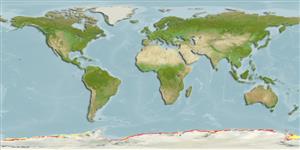>
Perciformes/Notothenioidei (Icefishes) >
Artedidraconidae (Barbled plunderfishes)
Etymology: Artedidraco: Petrus (Peter) Artedi, (10 Mar.) 1705-35 (28 Sep.), a son of a clergyman from Anundsjö named Olaus Arctaedius, in the northern part of Sweden.In 1729 he changed his name from Arctaedius to Arctædi, a name still later simplified to Artedi (Ref. 45335).
More on author: Waite.
Environment: milieu / climate zone / depth range / distribution range
বাস্তুসংস্থান
সামুদ্রিক তলদেশ বিহারী; গভীরতার পরিসীমা 56 - 460 m. Polar; 65°S - 79°S
Southern Ocean: East Antarctica (Ross Sea, South Victoria Land, MacRoberston Land, Queen Mary Land, Weddell Sea, Queen Maud Land, Davis Sea, Enderby Land).
আকৃতি / ওজন / Age
Maturity: Lm ? range ? - ? cm
Max length : 14.6 cm TL পুরুষ/ লিঙ্গ অনিধর্ারিত ; (Ref. 5181); সবের্াচ্চ প্রকাশিত ওজন : 25.60 g (Ref. 124149); সবের্াচ্চ প্রকাশিত ওজন : 25.60 g
Found on the sublittoral and continental shelf. Adults feed mainly on polychaetes and to a lesser extent, isopods (Ref. 5181).
Eakin, R.R., 1990. Artedidraconidae. p. 332-356. In O. Gon and P.C. Heemstra (eds.) Fishes of the Southern Ocean. J.L.B. Smith Institute of Ichthyology, Grahamstown, South Africa. (Ref. 5181)
IUCN Red List Status (Ref. 130435)
Threat to humans
Harmless
Human uses
মৎস্য: আকর্ষণবিহীণ
আরো তথ্য
সূত্র সংখ্যা এ্যাকুয়াকালচার (জলজ পালন) এ্যাকুয়াকালচার নকশা বংশ বংশানুগতিবিদ্যাElectrophoresesউতরাধিকার সুত্রে পাওয়া যোগ্যতারোগ প্রক্রিয়াজাতকরণ NutrientsMass conversion
সহযোগী ছবি সমূহStamps, Coins Misc.শব্দ ক্রোমোজোমের ধরণ গতি সাতাঁরের কায়দা ফুলকা এলাকাOtolithsমস্তিস্ক সমূহদৃষ্টি
হাতিয়ার
Special reports
Download XML
ইন্টারনেট সুত্র
Estimates based on models
Preferred temperature (Ref.
123201): -1.8 - 0.3, mean -1.1 °C (based on 238 cells).
Phylogenetic diversity index (Ref.
82804): PD
50 = 0.5156 [Uniqueness, from 0.5 = low to 2.0 = high].
Bayesian length-weight: a=0.00661 (0.00419 - 0.01042), b=3.02 (2.88 - 3.16), in cm total length, based on LWR estimates for this species & (Sub)family-body (Ref.
93245).
ট্রফিক পর্যায়ে (Ref.
69278): 3.2 ±0.41 se; based on food items.
স্থিতিস্থাপক (Ref.
120179): মাধ্যম , সর্বনিম্ন প্রজন দ্বিগুনের সময় ১.৪-৪.৪ বৎসর (Fec=170-310).
Fishing Vulnerability (Ref.
59153): Low vulnerability (10 of 100).
